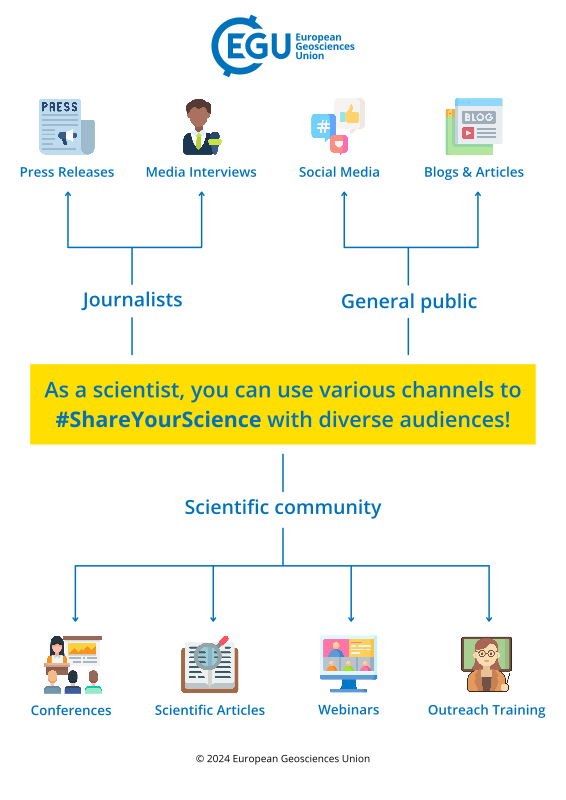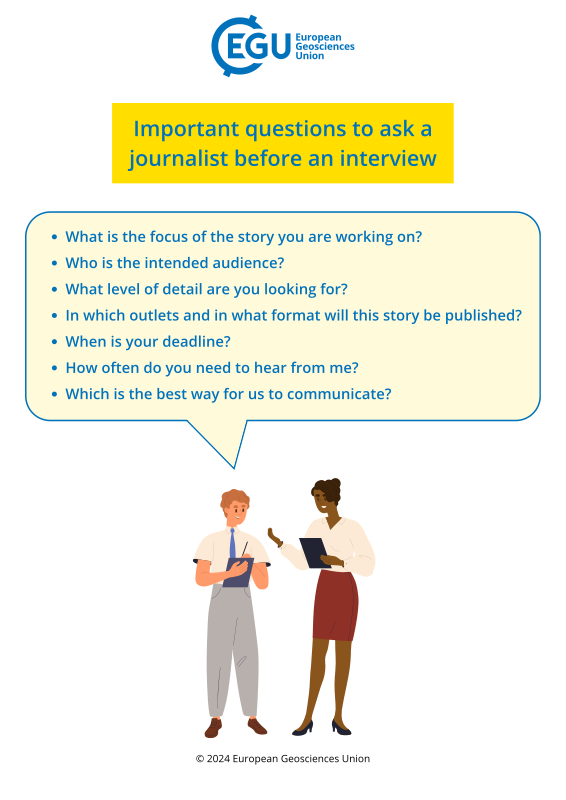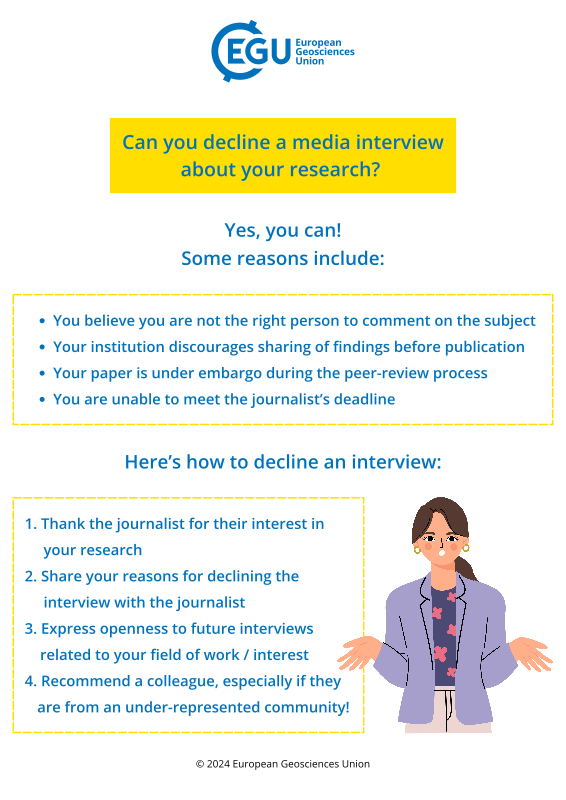Science-media toolkit
As a scientist you will probably at some point be required to speak about your research with a member of the media. If you have not had any experience of this you may feel some trepidation at this prospect, but EGU's science-media toolkit aims to empower you to communicate with confidence.
Sharing your science with the media is an effective way to get your name out there and inspire others to learn about your field. Beyond how this benefits you personally and professionally, your research has the potential to drive real change, with decision makers and with members of the public.
Communicating with the media also benefits you directly. Press clippings and images of your name quoted in published articles can be added to grant applications or used as evidence in future projects. It also offers you the opportunity to connect with other experts, create new research collaborations and get new insights into your work. Finally, many organisations recognise and appreciate scientists who engage in science communication and outreach, so this can be an added boost to your career prospects!
Same science, different language: why do scientists and journalists struggle to communicate with each other?
As part of our #ShareYourScience initiative in 2023, EGU sought feedback from journalists in Europe and beyond about their experiences working with scientists. The survey responses are interesting to say the least: despite ample evidence of the science-media communication gap, that gap does not exist because scientists are unwilling to engage with the media. Read the Press Release and results.
What do researchers have to say to journalists who want to engage in science communication? Watch these videos to learn about the opinions of three scientists on the importance of understanding the communications gap.
- Iris van Zelst (German Aerospace Centre): Why journalists might sensationalise science and finding your science story (YouTube)
- Lemmy Namayanga (University of Zambia): How scientists and journalists can work together to avoid misrepresenting facts (YouTube)
- Florence Mainguenad (York University, Aix-Marseille University and INRAE): The importance of explaining vocabulary, concepts and definitions (YouTube)
Want to share your science but don't know where to begin?
As a scientist, you can share your science in numerous ways!
- Blogs and articles
- Media interviews
- Comments about topical/current events
- Press release
- Press conference
- Speech or lecture at outreach events
- Social media communication
You should also be careful with using jargon, and misleading terms. For advice on both of those issues, as well as advice if you are concerned about getting misleading headlines, watch these videos to avoid common press interview mishaps:

Useful resources for getting started with communicating to the media:
- EGU Guide: Is my research newsworthy (PDF document, 79.8 KB)?
- EGU Guide: Tips for Communicating with the Media (Press Releases) (PDF document, 56.7 KB)
- EGU Guide: Tips for Communicating with the Media (Responding to Current Events) (PDF document, 58.2 KB)
- EGU Webinar How To Communicate Sensitive Science To Non-experts (YouTube)
- EGU blogs: Stop the press!: How to pitch your research to a journalist or editor
- EGU blogs: From paper to press release: making your research accessible to the wider public
- EGU blogs: The European Science-Media Hub: Bringing scientists, journalists and policymakers together
- EGU blogs: Geoscience communication: A smart investment
- EGU blogs: Geosciences Column: Flooded by jargon
What to expect when a journalist wants to speak to you
When you are first approached by a journalist, it can be challenging to process all the information that they need from you, often on a very short timeline. It is important to know that even when they are working to a deadline, taking the time to ask some key questions can be essential in ensuring that both you and the journalist have the best experience.
Questions to ask a journalist when contacted for an interview
- What is the focus of the story you are working on?
- Who is the intended audience?
- What level of detail are you seeking?
- In which outlets and in what form will this story be published?
- When is your deadline?
- How often do you need to hear from me, and which is the best way for us to communicate? (Email, phone, in person)
Can you decline a media interview about your research?
Yes, you can! Declining an interview is always an option, but it is important to think about why you are doing so. Reasons to decline may include:
- You believe you are not the right person to comment on the subject
- Your institution discourages sharing of findings before publication
- Your paper is under embargo during the peer-review process
- You are unable to meet the journalist's deadline
How to decline the interview:
- Thank the journalist for their interest in your research
- Share your reasons for declining the interview
- Express openness to future interviews related to your field of work/interest
- Recommend a colleague, peer or expert better suited to talk with the journalist
Useful resources for when a journalist reaches out asking for an interview:
- EGU Guide: Tips for Communicating with the Media (Press Conferences) (PDF document, 211.8 KB)
- EGU Guide: Tips for Communicating with the Media (Press Releases) (PDF document, 56.7 KB)
- EGU Guide: Tips for Communicating with the Media (Responding to Current Events) (PDF document, 58.2 KB)
- EGU Webinars: What the Media wants to hear from you (YouTube)
- EGU Webinars: Look Who's Talking: Decoding Science for a Non-science Audience (YouTube)
- EGU blogs: The Global South Climate Database: one thousand experts in one year!
- EGU blogs: An end to the 'manel'? 3 things you can do to help reduce the existence of all-male-panels.


Scientist communicators share their advice
Experienced researchers can be useful sources of advice when thinking about engaging with journalists. These scientists share their top tips for how best to connect your research with the media.
- John Bolten (NASA): The importance of your message and how you share it (YouTube)
- Katharina Perny (University of Natural Resources and Life Sciences, Vienna): What journalists want to be able to write meaningful stories and how to help them do this without losing essential context (YouTube)
- Hannah Sophia Davies (GFZ Potsdam): The fun in taking time to build relationships with journalists and communicate your science with them (YouTube)
- Iván Lizaga (Isotope Bioscience Laboratory, Ghent University): What to do when you think a journalist isn't asking the most interesting question about your work (YouTube)
- Karen Abogadil (York University): How to edit your information and only share the data that is appropriate for the level of communication (YouTube)
More communication resources:
- EGU short course: Blogging for beginners (YouTube)
- EGU blogs: So you want to make a podcast….
- EGU blogs: Get the picture? How choosing the right photograph can add value to your science communication
